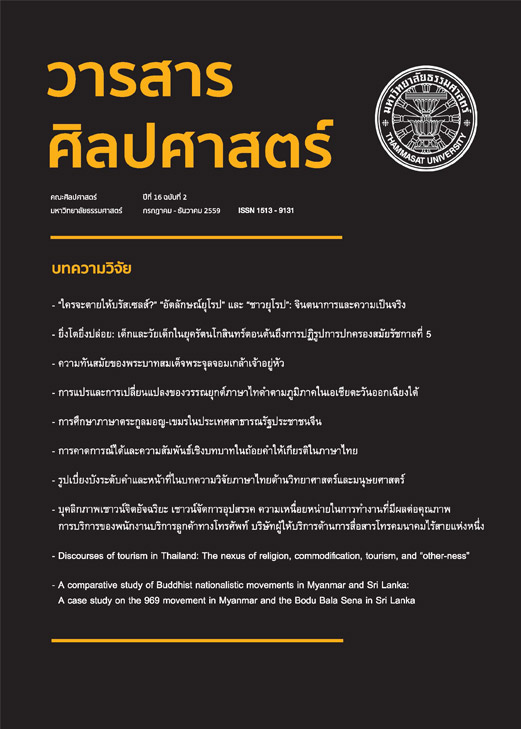A comparative study of Buddhist nationalistic movements in Myanmar and Sri Lanka: A case study on the 969 movement in Myanmar and the Bodu Bala Sena in Sri Lanka
Main Article Content
บทคัดย่อ
This research explores the tendency of recent extreme Buddhist nationalistic movements which have developed in some Theravadin Buddhist countries especially in Sri Lanka and Myanmar. Myanmar is a Southeast Asian country while Sri Lanka is actually located in South Asia but has a lot of cultural and religious connections with the Theravadin Buddhist countries in Southeast Asia. As Theravada Buddhism is the predominant religion in mainland Southeast Asia, and one of the most important religions in the whole of Asia, Sri Lanka’s religious origins and Southeast Asian popular religion needs to be compared both, in the context of Sri Lanka, and Southeast Asian countries. Since in the modern era both Myanmar and Sri Lanka share significant experiences of Buddhist Nationalistic sentiments, and these two countries had over a millennium of religious contact, we can find many similarities in both societies. Looking into the Theravada Buddhist traditions we found in the records that there were also historical Buddhist nationalistic movements in both countries. Nowadays, modern technology and convenient travel has sped up the spreading of this phenomenon. The emergence of Buddhist nationalism and the Buddhist nationalistic movements, with their anti-Muslim sentiments in Sri Lanka and Myanmar, are related to the politicization of Buddhism in Southeast Asia and South Asia. In more detail, the differences of Buddhist nationalistic phenomenon are related to the different contexts of their societies. For example, the Buddhist monks in Myanmar have high levels of political influences but were not allowed to become parliament members or party leaders. On the other hand in Sri Lanka, Buddhist monks have participated in the political field for decades. The final phase of this case study involves field interviews in different places throughout Sri Lanka. These interviews provided information for more individual consideration of religious nationalism which includes Buddhist nationalism and may direct future research on this issue.
งานวิจัยนี้สำรวจแนวโน้มของการเคลื่อนไหวแบบชาตินิยมแนวพุทธสุดโต่งที่พัฒนาขึ้นไม่นานนี้ ในประเทศซึ่งนับถือศาสนาพุทธเถรวาทโดยเฉพาะในศรีลังกากับพม่า พม่าเป็นประเทศหนึ่งในกลุ่มเอเชียตะวันออกเฉียงใต้ในขณะที่ศรีลังกาตั้งอยู่ในเอเชียใต้ แต่มีความสัมพันธ์ทางศาสนาและวัฒนธรรมอย่างมากกับประเทศที่นับถือพุทธศาสนาเถรวาทในเอเชียตะวันออกเฉียงใต้ ในฐานะที่ศาสนาพุทธเถรวาทเป็นศาสนาโดดเด่นในเอเชียตะวันออกเฉียงใต้ ทั้งเป็นหนึ่งในศาสนาอันสำคัญที่สุดของเอเชีย ต้นกำเนิดทางศาสนาในศรีลังกาจำเป็นต้องถูกเปรียบเทียบกับศาสนาหลักของเอเชียตะวันออกเฉียงใต้ ทั้งในบริบทของประเทศศรีลังกาเองกับประเทศในกลุ่มเอเชียตะวันออกเฉียงใต้ ทั้งพม่ากับศรีลังกาในยุคสมัยใหม่ต่างมีประสบการณ์เกี่ยวกับความรู้สึก ในชาตินิยมแนวพุทธร่วมกัน อีกทั้งสองประเทศนี้มีความสัมพันธ์ทางศาสนากันมายาวนานนับพันปี เราสามารถพบความคล้ายคลึงหลายประการในสังคมของทั้งสองประเทศ เมื่อมองเข้าไปในประเพณีของพุทธศาสนาแบบเถรวาท เราพบในบันทึกว่าเคยมีการเคลื่อนไหวแบบชาตินิยมแนวพุทธในทั้งสองประเทศ ปัจจุบันนี้เทคโนโลยีสมัยใหม่และการเดินทางที่สะดวกได้แผ่ขยายปรากฏการณ์นี้อย่างรวดเร็ว การเกิดขึ้นของลัทธิชาตินิยมแนวพุทธและการเคลื่อนไหวของลัทธินี้ด้วยความรู้สึกต่อต้านมุสลิมในศรีลังกากับพม่านั้นสัมพันธ์กับขบวนการทำพุทธศาสนาให้เป็นการเมืองในเอเชียใต้และตะวันออกเฉียงใต้ ความแตกต่างของปรากฏการณ์ชาตินิยมแนวพุทธโดยรายละเอียดนั้นสัมพันธ์กับบริบทที่แตกต่างของสังคม ยกตัวอย่างเช่น ภิกษุชาวพุทธในพม่ามีอิทธิพลทางการเมืองอยู่ในระดับสูง แต่ไม่ได้รับอนุญาตให้เป็นสมาชิกรัฐสภาหรือผู้นำพรรค ตรงกันข้ามกับศรีลังกาที่ภิกษุชาวพุทธเข้าร่วมทางการเมืองนับได้เป็นทศวรรษมาแล้ว ช่วงสุดท้ายของกรณีศึกษาเกี่ยวข้องกับการสัมภาษณ์ภาคสนามในสถานที่ต่าง ๆ ทั่วศรีลังกา บทสัมภาษณ์เหล่านี้ให้ข้อมูลสำหรับการพิจารณาในเชิงปัจเจกในเรื่องลัทธิชาตินิยมทางศาสนาอันรวมถึงลัทธิชาตินิยมแนวพุทธ ซึ่งอาจกำหนดงานวิจัยในอนาคตเกี่ยวกับประเด็นนี้


